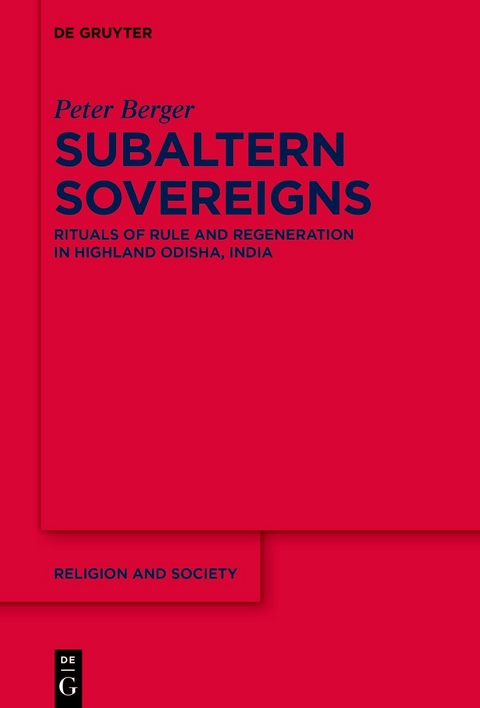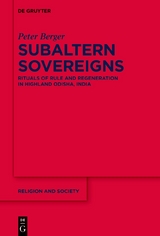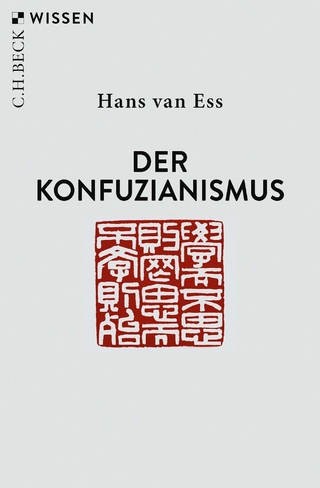Subaltern Sovereigns
Rituals of Rule and Regeneration in Highland Odisha, India
Seiten
2023
De Gruyter (Verlag)
978-3-11-045807-7 (ISBN)
De Gruyter (Verlag)
978-3-11-045807-7 (ISBN)
The series Religion and Society (RS) contributes to the exploration of religions as social systems– both in Western and non-Western societies; in particular, it examines religions in their differentiation from, and intersection with, other cultural systems, such as art, economy, law and politics. Due attention is given to paradigmatic case or comparative studies that exhibit a clear theoretical orientation with the empirical and historical data of religion and such aspects of religion as ritual, the religious imagination, constructions of tradition, iconography, or media. In addition, the formation of religious communities, their construction of identity, and their relation to society and the wider public are key issues of this series.
The vast and ancient topic of kingship in India has mostly been studied from the perspectives of rulers and other elites. But what constitutes sovereignty viewed from "below"? This book — ethnographic and comparative in its essence — deals with indigenous conceptualizations of sovereignty taking as its starting point a local proverb that connects the ritual (Dasara) of the former king with festivals performed by his "tribal" subjects. The first part of the book initially introduces some pan-Indian ideas of kingship and proceeds to discuss indigenous notions of sovereignty as represented in rituals and myths in the region concerned (highland Odisha). The second part is devoted to the investigation of the proverbial performances. Mainly based on historical sources first the Dasara festival of the king is discussed, subsequently the indigenous rituals are described and analyzed, which the author ethnographically documented around the turn of the millennium. Ultimately, the proverb and the rituals constitute the idea of a sacrificial polity in which rulers and ruled share sovereignty in the sense that they are co-responsible for the flow of life.
The vast and ancient topic of kingship in India has mostly been studied from the perspectives of rulers and other elites. But what constitutes sovereignty viewed from "below"? This book — ethnographic and comparative in its essence — deals with indigenous conceptualizations of sovereignty taking as its starting point a local proverb that connects the ritual (Dasara) of the former king with festivals performed by his "tribal" subjects. The first part of the book initially introduces some pan-Indian ideas of kingship and proceeds to discuss indigenous notions of sovereignty as represented in rituals and myths in the region concerned (highland Odisha). The second part is devoted to the investigation of the proverbial performances. Mainly based on historical sources first the Dasara festival of the king is discussed, subsequently the indigenous rituals are described and analyzed, which the author ethnographically documented around the turn of the millennium. Ultimately, the proverb and the rituals constitute the idea of a sacrificial polity in which rulers and ruled share sovereignty in the sense that they are co-responsible for the flow of life.
lt;strong>Peter Berger, Universität Groningen, Niederlande.
| Erscheinungsdatum | 28.04.2023 |
|---|---|
| Reihe/Serie | Religion and Society ; 66 |
| Zusatzinfo | color maps |
| Verlagsort | Berlin/Boston |
| Sprache | englisch |
| Maße | 155 x 230 mm |
| Gewicht | 814 g |
| Themenwelt | Geisteswissenschaften ► Religion / Theologie ► Weitere Religionen |
| Schlagworte | Adivasi • Adivasis • Herrschaft • Odisha • Ritual • Sovereignty |
| ISBN-10 | 3-11-045807-1 / 3110458071 |
| ISBN-13 | 978-3-11-045807-7 / 9783110458077 |
| Zustand | Neuware |
| Haben Sie eine Frage zum Produkt? |
Mehr entdecken
aus dem Bereich
aus dem Bereich
archäologische Fakten und Fiktionen im Neuheidentum
Buch | Softcover (2023)
Verlag Anton Pustet
24,00 €




